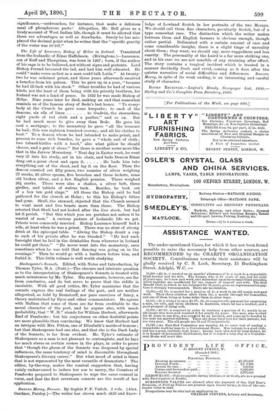Shakespeare's Sonnets. Edited, with Notes and Introduction, by Thomas Tyler,
M.A. (Nutt.)—The obscure and intricate question as to the interpretation of Shakespeare's Sonnets is treated with much minuteness by Mr. Tyler. His arguments, however, are far from conclusive, and do but serve to prove that the riddle is insoluble. With all good critics, Mr. Tyler maintains that the sonnets express the real feelings of the poet, and are neither allegorical, as held by Bernstorff, nor pure exercises of fancy, a theory maintained by Dyce and other commentators. He agrees with Hallam that some of them are far from creditable to the moral character of the poet, and he argues also, with much probability, that "W. H." stands for William Herbert, afterwards Earl of Pembroke ; but his conjectures on other doubtful points are more plausible than convincing. We know that Herbert had an intrigue with Mrs. Fitton, one of Elizabeth's maids-of-honour ; but that Shakespeare had one also, and that she is the Dark Lady of the Sonnets, is far from evident. Mr. Tyler's estimate of Shakespeare as a man is not pleasant to contemplate, and he lays too much stress on certain scenes in the plays, in order to prove that "though the gloom of the Sonnets was deepened by special influences, the same tendency of mind is discernible throughout Shakespeare's literary career." But what mood of mind is there that is not represented by the most versatile of dramatists ? The editor, by-the-way, makes the comical suggestion that, having vainly endeavoured to induce her son to marry, the Countess of Pembroke proposed to Shakespeare to urge the same counsel in verse, and that the first seventeen sonnets are the result of her application.


































 Previous page
Previous page